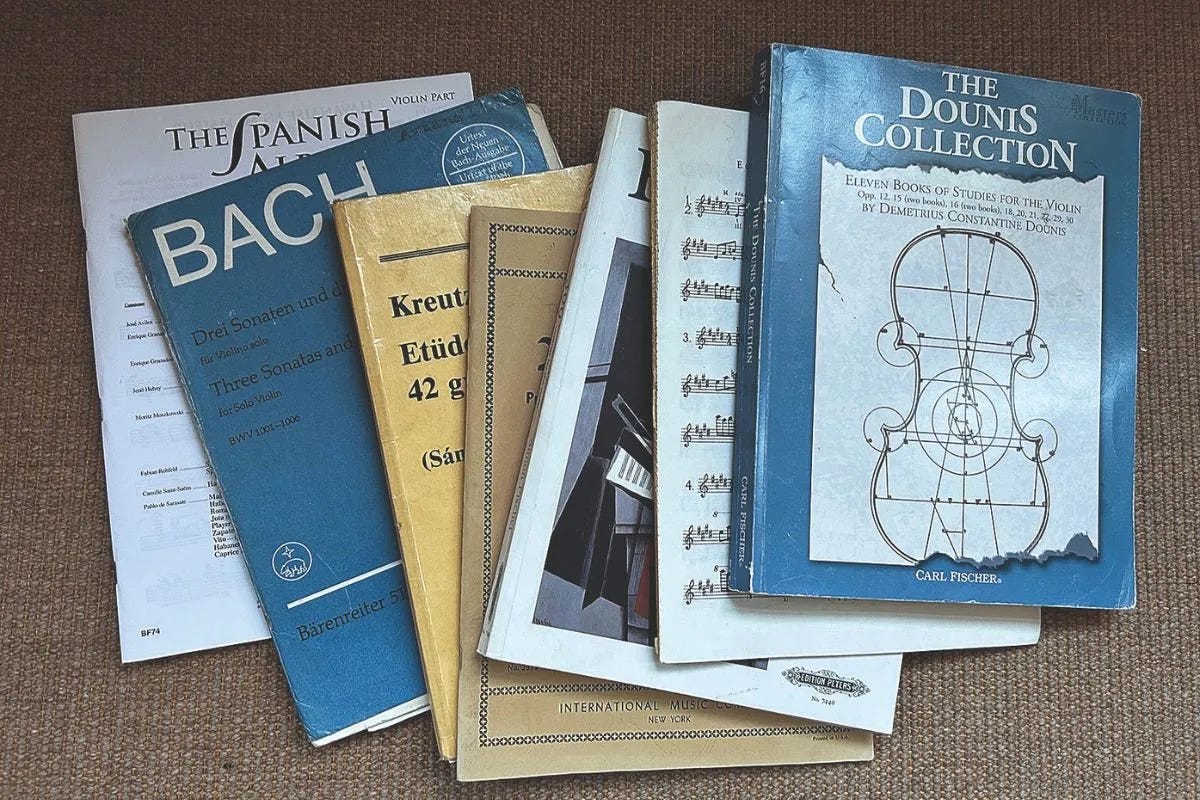#100daysofpractice
I’m taking up Hilary Hahn’s challenge of practising the violin every day for the next 100 days – for the second time. Who’s in?
Two years ago exactly, as I idly scrolled Instagram, I came across Hilary Hahn’s post about her #100daysofpractice challenge and before I could stop myself, I committed to it. I wrote about it for BBC Music Magazine, here.
I wasn’t intending to do it again, but I just saw her post about starting her eighth season, and thought: what have I got to lose? The first time was such an interesting and powerful experience, and although it’s certainly a time commitment, it’s not a particularly onerous one. I do usually practise on a fairly regular basis for the amateur orchestras in which I play, but it tends to be in binges, and focused on the orchestral repertoire, rather than technique or solo repertoire.
But the challenge is about so much more than music or the instrument itself – the benefits are as much emotional and psychological as musical. If you play an instrument of any description, I highly recommend it.
Here are just a few of the learnings that I wrote about in my article:
Deprocastination
For a procrastinator like me, making the daily commitment takes the stress out having to shilly-shally around deciding whether I’m going to practise or not, or even at what time. Once you’ve made the commitment, there are no choices to make, and life is so much more simple.
Mindfulness
A certain element of practice is sheer mindfulness: playing a long note and listening for all the bumps and the quality of the sound is analagous to listening to one’s breathing when meditating. There’s something very calming and restful about it.Social media antidote
If you’ve resolved to scroll less social media in 2025, the hyperfocus of reading music – whether sightreading a study or piece – is actually rather similar, as your eyes flit down the screen, only here the brain is engaged and you are creating something.Listening
I particularly enjoy the start of the process where I can feel myself starting to tune in properly, engaging my listening brain. The advantage of not necessarily having a goal of performing anything particular is that I don’t have to worry about judging myself as good or bad, but can just try to be very objective – is it sharp/flat? What is the sound like? Can I make it faster? True, honest listening is possibly the most important skill we require as musicians – and as human beings.
Trust the process
One of the best lessons of 100 days of doing something consistently – even if it’s just for five or ten minutes – is that things tend to get better of their own accord. There’s something about engaging the brain in a certain constructive way, every day, that makes problems solve themselves, and builds a strength and awareness that makes everything better, regardless. This is a lesson I wish I had understood as a youngster, when I would desperately practise three hours the night before my lesson – and also with diet and fitness. If you do something every day, you get better at it (as long as you’re listening properly, obviously). It really is that simple.
Time is relative
One of the advantages of middle age is that one realises how short 100 days actually is and how quickly they pass. This makes the challenge much less daunting. April will come around in no time.
Flexibility is okay
According to Hilary Hahn’s rules, ‘practice’ is anything that supports your playing, so in theory it could be reading a book about the violin, or listening to something carefully. Last time I did it, for example, if I was getting home late and hadn’t practised, it was enough for me to pick up my violin and spend 5 minutes moving my fingers up and down, without the bow. It’s better to allow that than to give up the whole thing because of one busy or difficult day. I might not learn the Tchaikovsky Violin Concerto in the time, but that’s not the point.
Quitting is not an option
The nature of the challenge means that it quickly gets to the point where it would be more upsetting to NOT practise than it would be just to pick up the violin and do something, anything.
The inner game
The process is as much about playing with your own mind and learning how to overcome your physical and psychological barriers as it is about taming the demon violin.
Peer pressure
And of course, talking about it on social media makes it harder to quit.
So… who’s in? Will I see you on 10 April?






I’m in! Thanks for the challenge. A sort of New Year’s resolution. Can you recommend any amateur orchestras in London for a grade 8 cellist? Something to aim for…
I’ve recently taken up piano and manage to practice on most days (probably 5/7). I’m enjoying it hugely despite the utterly excruciating noises I’m producing. Whether I’ll ever be even passable, I don’t know but the process is hugely rewarding as is the sense of achievement in those few moments when I produce something approximating music.